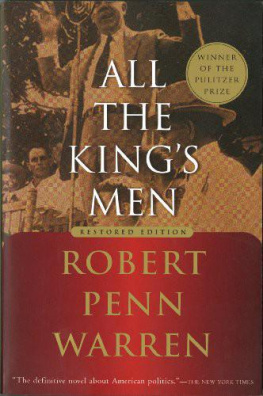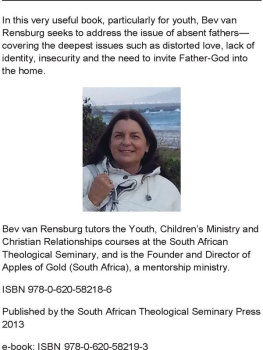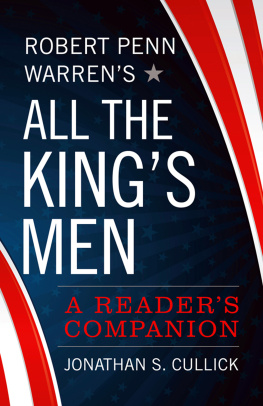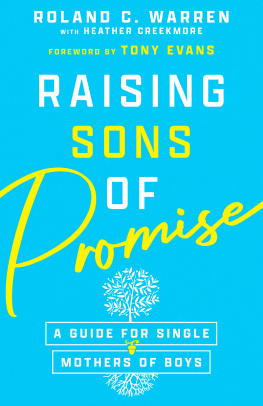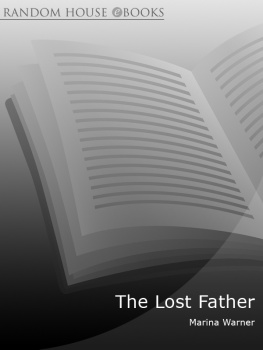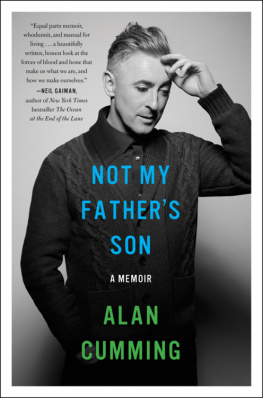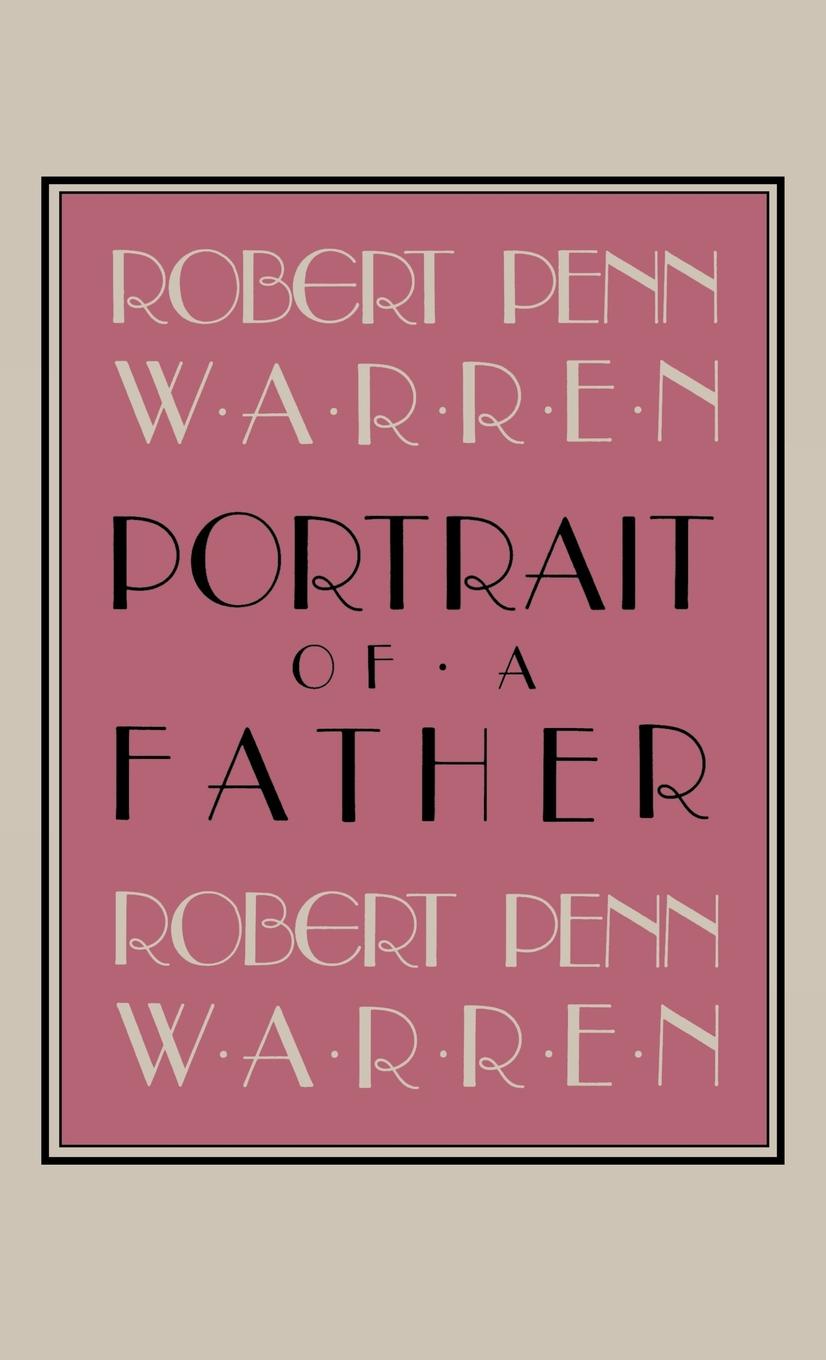PORTRAIT
OF A
FATHER
ROBERT PENN
WARREN
PORTRAIT
OF A
FATHER

Publication of this book has been assisted by a grant from the Gannett Foundation
Copyright 1988 by Robert Penn Warren
Published by the University Press of Kentucky
Scholarly publisher for the Commonwealth, serving Bellarmine College, Berea College, Centre College of Kentucky, Eastern Kentucky University, The Filson Club, Georgetown College, Kentucky Historical Society, Kentucky State University, Morehead State University, Murray State University, Northern Kentucky University, Transylvania University, University of Kentucky, University of Louisville, and Western Kentucky University.
Editorial and Sales Offices: Lexington, Kentucky 40506-0336
The essay Portrait of a Father was originally published in The Southern Review (Spring 1987). Mortmain, copyright 1960 by Robert Penn Warren, is from New and Selected Poems, 1923-1985 by Robert Penn Warren, published by Random House, Inc. Both Portrait of a Father and Mortmain have been revised by the author for this edition.
Library of Congress Cataloging-in-Publication
Data appear at the end of the book.
Contents
PORTRAIT
OF A
FATHER
M Y FATHER, as the years since his death pass, becomes to me more and more a man of mystery. I do not mean to say that I do not know the man he was. The personality and character of no man could be more clearly delineatedand this in even the smallest detail. What is mysterious is the personal history from which that man emerged. This involves, of course, the mystery of his family, especially of his mother and father.
Here I must mention another mystery, a related mystery which, strangely enough until now, I had not recognized as a mystery. My mother, who had told me much of the past, had never, not even once, mentioned her earlier acquaintance with the man whom she was to marry. Certainly, he was not at that time living in the region, nor had been there when her family came. As far as her account went, her husband might not have even existed until her wedding day in 1904.
Once when I was a boy, I saw, very briefly, in the hands of my grandfathers second wife, what I then supposed to be the Bible of my fathers family. In any case, it presumably had the date of my fathers birth written inside. But, long since, I have decided that it must have been a new Bible bought after her marriage to become her own family Bible. If so, she had chosen the right stepson to claim for her record. After the death of her husband that stepson, though he could at that time ill afford it, bought her a house and watched over her, even if he rarely saw her.
I knew Grandma Jenny because every summer of my boyhood I spent long periods with my maternal grandfather on his farm, a few miles away from her house in the village of Cerulean Springs, Kentucky. Once a year I was to make her the visit of a day and a night. This was at my fathers command, for, as a boy, I found that visit dull, especially with her dull daughter and son-in-law. My father stood his ground and stated that his stepmother was a good woman who did the best she could according to the lights available to her. Indeed such a phrase was not uncommon on his lips: according to the lights available to the person in question.
All that I know of my paternal grandfather is that he, a captain I seem to remember, had served in the Confederate army, and had fought first at Shilohwhere my maternal grandfather had found his own first baptism of fire. That was all that my father ever told me of his family except that the first Warren of his family had come to Virginia fairly early, and that his people, toward the War of 1812, had pioneered from North Carolina, across Tennessee, to the Valley of the Cumberland in the southwest of Kentucky.
I must now speak of my father as I remember him from my boyhood. At that time, he was six feet tall. I know this because, when I was a boy of fifteen or so and was worried about my own slow growth, I asked him how tall he was. At another time he told me that he had never weighed more than one hundred and forty-five pounds. He looked much larger because his shoulders were broad and he was, even into some years, very erect. He was, as I knew from a boys curiosity and observation, unusually strong. I had early noticed that his body seemed to be all bone and sinew.
His features were regular but with a somewhat prominent Roman nose. His eyes were a kind of brownish-hazel color. His ordinary expression was calm, but sometimes thoughtful and even introspective. The jaws seemed to be carried firmly but unaggressively. In usual greeting or in pleasure his smile might be sudden, and occasionally, infectious.
My fathers healthor it may often have been only self-controlwas remarkable. Never in his eighty-five years was he to spend a day in bed or even see a doctor except during one protracted illness when I was six years old. In his entire life he never went to a dentist. Shortly before his death he remarked: Naturally, in late years, I have had to remove two or three teeth myself. It must be added that if wife or child had even a hurt finger a doctor was called. No theology had ever been involved in the issue.
At one time he told me that when he was twenty-nine he had been going seriously bald. Hair, he said, was coming out by the handful. In saying this he had made a sudden unconscious gesture, up and down, with his right hand, as though throwing something to the flooras though repeating an angry or despairing gesture from all those years before. For that instant there was the angry and despairing expression on his face which I had never seen before, nor have ever seen since. At that period he had been courting a girl some years younger than he. Her name was Anna Ruth Penn.
Bald or not, he was successful in his suit. Year after year, on his birthday, February 14, when at breakfast time my mother would pass behind his chair, she would lean in her humorous and loving way and kiss the top of the bald pate and murmur: My comic valentine. He would blush and stir in a kind of boyish embarrassment, and say: Oh, shucks.
Later on, when such things might cross my mind, I imagined that he must have been a rather handsome young man. Even as I now think of him in his forties he was somewhat memorable, with the dignified calm of his face, the thrust of his Roman nose, and, especially in the glint of artificial light, the bald head seeming to be carved from some stone, even marble. Not that in my boyhood I had ever seen a bust, or any statuary, except in pictures. Certainly there had been some such pictures in the books of history which he had begun very often to read to me.
For another preliminary but to me important general fact, there was his positive aversion to violence of any kind. This fact seemed then a trifle more odd than now. Personal violence seemed, by hearsay at least, common and even in principle acceptable. A neighbor of ours was generally known to have shot a man to death. He was a citizen in good standing. My father never mentioned this matter to me, and more than once as I grew older he said that law is the mark of civilization.
Certainly he could know anger, and I recognized the physical signals of that rare anger: a widening of the nostrils and a whitening of the flanges toward the base, and a tightening of the muscles of the jaw on each side so that the muscles would bulge a little. His words would then be much slower than usual, carefully spaced, seemingly very impersonal. Indeed, the anger usually seemed to be somehow directed to a general attitude or idea rather than to a person who might be involved.



